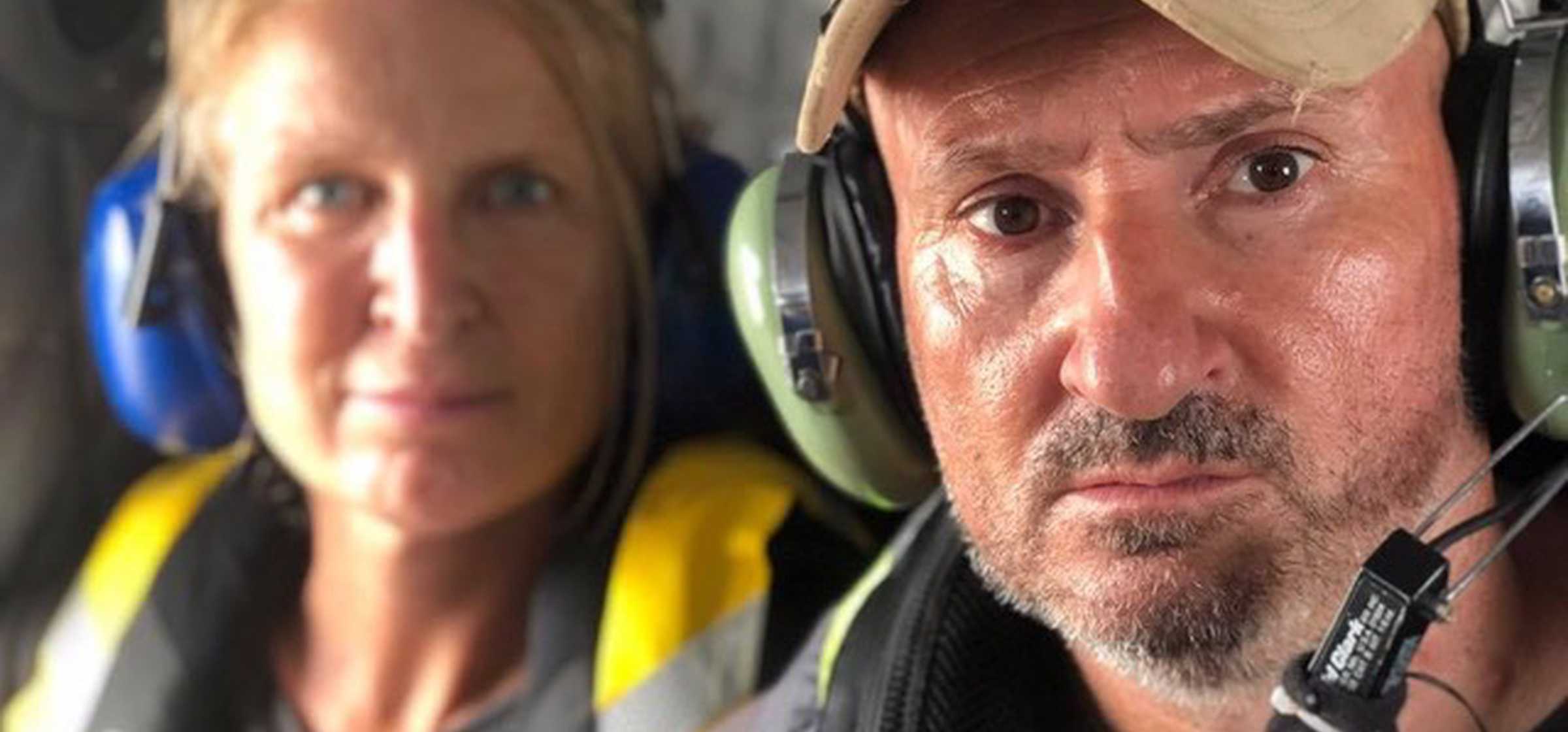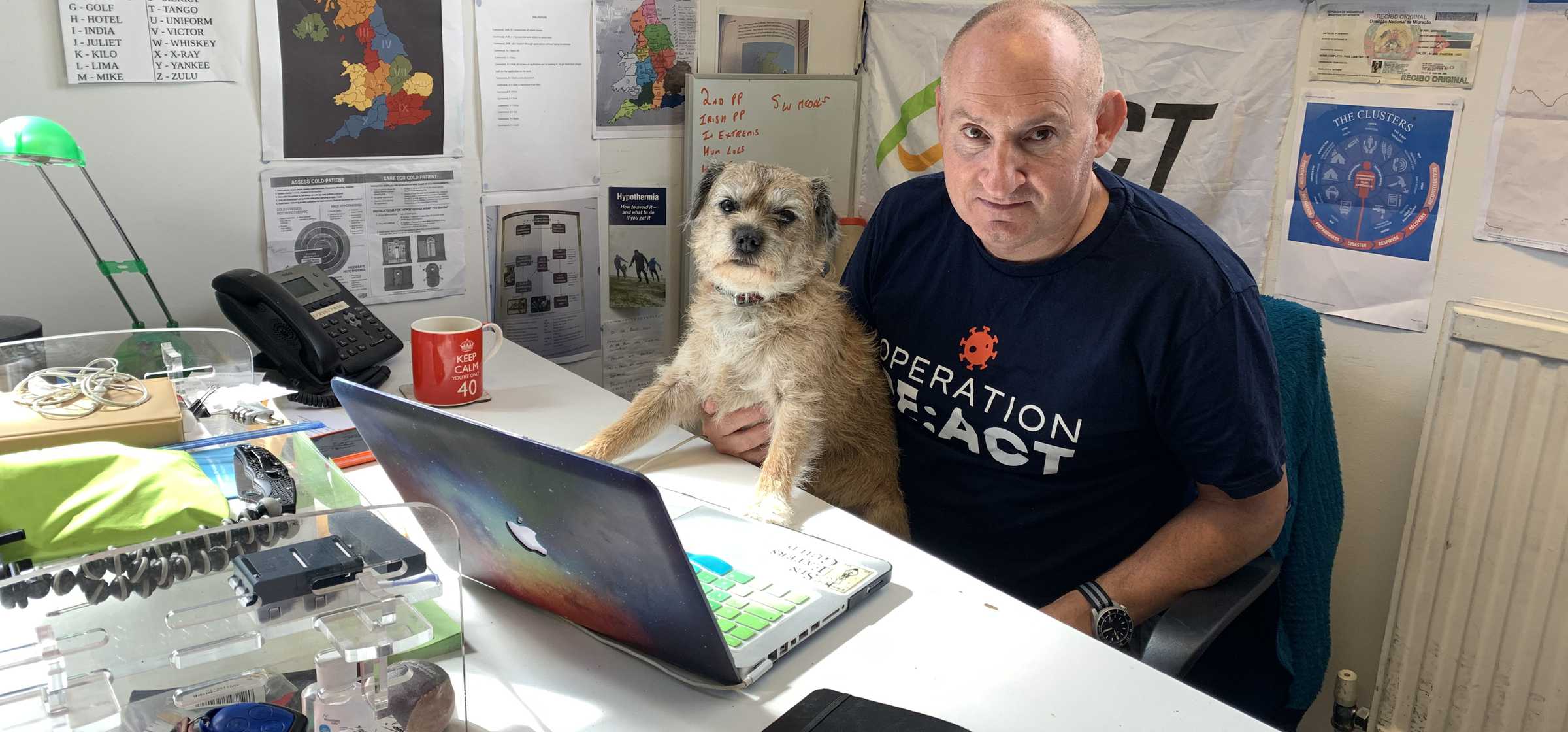Paul Taylor: Entering the unknown (part 2)

Posted by Alex Whitty 11th September 2020 Interviews
Estimated Reading Time: 6 mins
We continue our inside look at what it’s like to be one of the first international responders at the scene of a disaster with RE:ACT Operations Response Manager, Paul Taylor.
In Part 1, Paul discussed his preparation and described what it’s like to head into the immediate aftermath of a disaster. In Part 2, we find out from Paul the importance of collaboration and leadership.
Your job puts you in some dangerous situations, do you feel that sense of danger?
“There are risks we take but we all accept that we have to. We do this because our instinct is to help people in crisis and you can’t do that from a safe, comfortable position. If we’re not prepared to put ourselves in those situations where we can help people, what’s the point of us being there?
“We’re trained and experienced, many of us are ex-military. That’s why we’re a bit different and why we’re more comfortable with accepting greater risk than maybe other charities are. We haven’t lived through the experience that the survivors have, we get there in the aftermath, although that can still be very dangerous.
“After the earthquake in Nepal in 2015, we were in Kathmandu loading a vehicle to go to Gorkha, which was the epicentre of the first earthquake. The ground started shaking and there was a deafening roar for about thirty seconds. The buildings around us started to collapse. We ran down the road to get out of the footfall of the collapsing buildings. The tarmac road that we were on was going up and down like a wave machine for about 10 minutes.
“Those situations give you a real feeling of how insignificant you are. Even in the military, there are actions you can take and mitigation you can put in place for potential dangers. But when it’s something of that magnitude, while there is evasive action you can take, you are completely at the mercy of mother nature.”
You mentioned last time how you deal with the scenes you witness, what about the volunteers that join you when the response teams arrive?
“I think when you’re leading teams, no matter where or doing what, you have to be self-aware and understand everyone is different. That’s especially true in a disaster zone; people will react differently to the same events, different people have different coping mechanisms.
“For example, in Haiti during Hurricane Matthew, two volunteers had to stop, sit down and have five minutes to compose themselves after witnessing some shocking scenes. Sometimes there’s a time to talk and offer support and sometimes you just need to give people some space. You have to read the situation. It’s about empathy and understanding.
“It’s also about administering self-care. Everyone has a responsibility to themselves as well as to each other. There’s the cliché that charity starts at home – well, humanitarianism starts with yourself. You’re no good to anyone else if you don’t look after yourself.”
How do you keep up morale?
“Small routines that might seem silly but they’re actually very important. In the mornings, we always have coffee and it’s always good coffee. It’s essential to have a few comforts and start the day with something you look forward to.
“Morale’s never been a problem when I’ve deployed. We’re a close-knit team and we’re all motivated and passionate about why we’re there. It can be exhausting and that takes its toll but we keep each other’s spirits up, we talk and we share things when we need to.”
Going back to when you first arrive in a country, is there a coordinated way for international responders to meet each other or is it a case of making yourself known?
“It’s both. In big disasters, you’ll always see the UN OCHA [UN Office for the Coordination of Humanitarian Affairs], a team from UN DAC [Disaster Assessment and Coordination], the World Food Programme, UNICEF, Médecins Sans Frontières, and World Central Kitchen, who help feed people affected as well as the staff of NGOs. You fit into that ecosystem.
“What you find if you are continually deployed to disasters is it’s often the same-old faces. You build little networks with people who look out for you. I often get WhatsApp messages from contacts from other charities asking if I’ve deployed.
“You could say there are two networks. There is the official network which is predominantly the UN which supports the national government and their disaster management agency. Then there are also subsidiary informal networks which are much quicker, which can be formed by locals.
“If you’re in a part of the world where there is lots of bureaucracy at play that can slow things down, so people navigate that by setting up WhatsApp groups. On that group you might put something like ‘I need to deliver food, can anyone help me out with a vehicle’ and they reply in 10 seconds: ‘You should speak to this guy because he’s renting out vehicles’. There are always those two layers to disaster response and they’re both effective for different reasons.
“The two keys to it all are trust and collaboration. Really they go hand-in-hand. One of our values at RE:ACT is ‘Trust and be trustworthy’ which means you have to intuitively trust people and demonstrate that and when you do, you’ll earn their trust back, and that makes everything easier and you start pooling your knowledge and resources together.”
Collaboration is one of those buzzwords that gets thrown about a lot, what does it mean to you, especially in a humanitarian context?
“Very little is achieved in isolation and anyone in a position of leadership has to harness the skills, experience and collective power of the team and steer it in the right direction. Collaboration brings diversity into play and prevents a blinkered approach. Actions can’t be taken based on one person’s decisions. You need to involve people, use their critical thinking skills and engage them.
“Humanitarian collaboration requires a high degree of emotional intelligence and the ability to quickly develop rapport. The ability to ‘read the room’ is a useful skill. In the initial stages of an emergency response, working partnerships are forged between individuals which reduces duplication of effort and wasted resources at an organisational level.
“In disaster response, everything you do is a race against the clock. The consequences of the decisions you make can directly impact people’s lives and making decisions in isolation is a sure way to make mistakes that could be fatal.
“You have to make the most of all available resources and gather as much information as you possibly can so you can make informed decisions. Always seek advice and consider it a sign of wisdom, not weakness.
“I don’t believe there is a single organisation or team in existence that wouldn’t benefit from collaboration and an open-minded, team-focused philosophy. In disaster response, it’s a necessity because the stakes are that much higher.”

We’ve touched on your military and your humanitarian experience, what lessons have you learned that apply to both?
“In the military, there’s a more directive style of leadership. That doesn’t tend to be the same style in the humanitarian sector but there are definitely moments when it’s needed in disaster response, when you’re at risk from secondary hazards or emergent earthquakes, tsunamis and hurricanes.
“When the ground starts shaking my experience is that the team will look you in the eye and you feel this is the ‘big leadership moment’. They may be scared and you probably are too. What they want is clear, unambiguous direction which is going to lead them to safety. That’s when those military leadership skills come in.
“The more experienced I’ve become, the more I’ve seen the clear advantage of letting go of the reins and giving my team the freedom to manoeuvre. Tell someone what to do but not how to do it. At RE:ACT, we’re always problem-solving and adapting. You won’t get that same ability by following a strict approach. Again, it comes down to trust and collaboration. Stay focused on the mission and rely on each other. People are depending on you to do just that.”
Finally, do you ever consider doing something else?
“I don’t think of what I do as a career choice. I feel compelled to help people and I can’t imagine there being a worthier cause.”
Help us continue our life-saving work at home and overseas. Please give what you can.
